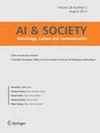Differences in stakeholders’ expectations of gendered robots in the field of psychotherapy: an exploratory survey
IF 2.9
Q2 COMPUTER SCIENCE, ARTIFICIAL INTELLIGENCE
引用次数: 0
Abstract
Abstract In the present study, qualitative and quantitative studies were conducted to explore differences between stakeholders in expectations of gendered robots, with a focus on their specific application in the field of psychotherapy. In Study I, semi-structured interviews were conducted with 18 experts in psychotherapy to extract categories of opinions regarding the use of humanoid robots in the field. Based on these extracted categories, in Study II, an online questionnaire survey was conducted to compare concrete expectations of the use of humanoid robots in psychotherapy between 50 experts and 100 nonexperts in psychotherapy. The results revealed that compared with the female participants, the male participants tended to prefer robots with a female appearance. In addition, compared with the experts, the nonexperts tended not to relate the performance of robots with their gender appearance, and compared with the other participant groups, the female expert participants had lower expectations of the use of robots in the field. These findings suggest that differences between stakeholders regarding the expectations of gendered robots should be resolved to encourage their acceptance in a specific field.心理治疗领域利益相关者对性别机器人期望的差异:一项探索性调查
在本研究中,通过定性和定量研究来探讨利益相关者对性别机器人的期望差异,重点关注其在心理治疗领域的具体应用。在研究一中,对18位心理治疗专家进行了半结构化访谈,以提取关于在该领域使用人形机器人的意见类别。基于这些提取的类别,在研究II中,进行了一项在线问卷调查,以比较50名心理治疗专家和100名非心理治疗专家对在心理治疗中使用人形机器人的具体期望。结果显示,与女性参与者相比,男性参与者更喜欢女性外表的机器人。此外,与专家相比,非专家倾向于不将机器人的表现与其性别外貌联系起来,与其他参与者组相比,女性专家参与者对机器人在该领域的使用期望较低。这些发现表明,利益相关者之间关于性别机器人期望的差异应该得到解决,以鼓励他们在特定领域的接受。
本文章由计算机程序翻译,如有差异,请以英文原文为准。
求助全文
约1分钟内获得全文
求助全文
来源期刊

AI & Society
COMPUTER SCIENCE, ARTIFICIAL INTELLIGENCE-
CiteScore
8.00
自引率
20.00%
发文量
257
期刊介绍:
AI & Society: Knowledge, Culture and Communication, is an International Journal publishing refereed scholarly articles, position papers, debates, short communications, and reviews of books and other publications. Established in 1987, the Journal focuses on societal issues including the design, use, management, and policy of information, communications and new media technologies, with a particular emphasis on cultural, social, cognitive, economic, ethical, and philosophical implications.
AI & Society has a broad scope and is strongly interdisciplinary. We welcome contributions and participation from researchers and practitioners in a variety of fields including information technologies, humanities, social sciences, arts and sciences. This includes broader societal and cultural impacts, for example on governance, security, sustainability, identity, inclusion, working life, corporate and community welfare, and well-being of people. Co-authored articles from diverse disciplines are encouraged.
AI & Society seeks to promote an understanding of the potential, transformative impacts and critical consequences of pervasive technology for societies. Technological innovations, including new sciences such as biotech, nanotech and neuroscience, offer a great potential for societies, but also pose existential risk. Rooted in the human-centred tradition of science and technology, the Journal acts as a catalyst, promoter and facilitator of engagement with diversity of voices and over-the-horizon issues of arts, science, technology and society.
AI & Society expects that, in keeping with the ethos of the journal, submissions should provide a substantial and explicit argument on the societal dimension of research, particularly the benefits, impacts and implications for society. This may include factors such as trust, biases, privacy, reliability, responsibility, and competence of AI systems. Such arguments should be validated by critical comment on current research in this area. Curmudgeon Corner will retain its opinionated ethos.
The journal is in three parts: a) full length scholarly articles; b) strategic ideas, critical reviews and reflections; c) Student Forum is for emerging researchers and new voices to communicate their ongoing research to the wider academic community, mentored by the Journal Advisory Board; Book Reviews and News; Curmudgeon Corner for the opinionated.
Papers in the Original Section may include original papers, which are underpinned by theoretical, methodological, conceptual or philosophical foundations. The Open Forum Section may include strategic ideas, critical reviews and potential implications for society of current research. Network Research Section papers make substantial contributions to theoretical and methodological foundations within societal domains. These will be multi-authored papers that include a summary of the contribution of each author to the paper. Original, Open Forum and Network papers are peer reviewed. The Student Forum Section may include theoretical, methodological, and application orientations of ongoing research including case studies, as well as, contextual action research experiences. Papers in this section are normally single-authored and are also formally reviewed. Curmudgeon Corner is a short opinionated column on trends in technology, arts, science and society, commenting emphatically on issues of concern to the research community and wider society. Normal word length: Original and Network Articles 10k, Open Forum 8k, Student Forum 6k, Curmudgeon 1k. The exception to the co-author limit of Original and Open Forum (4), Network (10), Student (3) and Curmudgeon (2) articles will be considered for their special contributions.
Please do not send your submissions by email but use the "Submit manuscript" button.
NOTE TO AUTHORS: The Journal expects its authors to include, in their submissions:
a) An acknowledgement of the pre-accept/pre-publication versions of their manuscripts on non-commercial and academic sites.
b) Images: obtain permissions from the copyright holder/original sources.
c) Formal permission from their ethics committees when conducting studies with people.
 求助内容:
求助内容: 应助结果提醒方式:
应助结果提醒方式:


